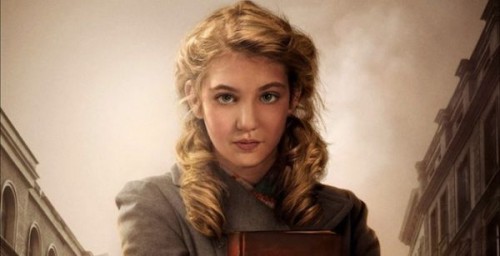
This cross-post by Natalie Wilson previously appeared at the Ms. Magazine Blog and appears as part of our theme week on Child and Teenage Girl Protagonists.
Though the film The Book Thief is narrated by Death (as is the book) and takes place during World War II—an era particularly riddled with death—the movie brims with life. A large part of this is due to the amazing young actress Sophie Nélisse who plays the protagonist, Liesel Meminger. It is not often that we get complex, brave female characters, especially ones who are not interested first and foremost either in romance or motherhood.
Liesel, unlike so many young heroines, resists romance—from her friend Rudy’s early problematic insistence and then throughout the remainder of the movie. Instead of being positioned in relationship to romantic partners, she has three male best friends—Rudy, Max and Hans (Papa)—as well as two females of great importance to her life, Rosa (Mama) and Ilsa Hermann (the mayor’s wife who, transgressively, supplyies Liesel with books). As for Liesel, like her futuristic counterpart, Katniss Everdeen, she is a life-saving heroine and inspirational rebel.
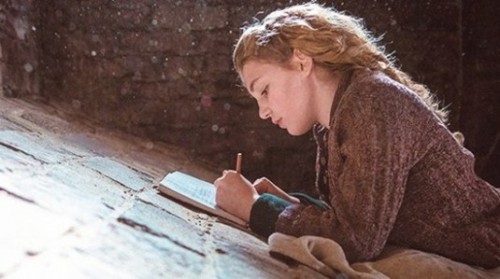
While I disagree with the The New York Times review, which likened the book to “Harry Potter and the Holocaust,” I have to concur with some of the suggestions the comparison implies, such as the importance of friendship, the love of whimsy and the existence of villainous persons that threaten all of humanity. The Book Thief has no wizards though; instead, its narrative rests on the shoulders of young Liesel, orphaned at the outset and taken in by a seemingly shrewish foster mother of the Disney wicked-stepmother-as witch variety. While Rosa is somewhat softened into a more likeable character by the end of the book, the film takes her character transformation in a more feminist direction, suggesting she was merely playing the part of shrew in order to protect the family during the tyrannical times in which they live.
Similarly, Hans, who at first comes off as too quick with the wives-are-such-a-nuisance type of comments, is revealed in the film to also be playing the role of a husband who bemoans his nagging wife, mocking her whenever the chance arises. As such, the two characters play out the role of a bickering married couple so as not to draw attention to their family or house. Here, the film hints at the social roles we are forced to occupy in order to not be singled out, to not be “other.” In so doing, it nods to the fluidity of identity and the ability to resist even the most tyrannical regimes via daily acts of transgression.
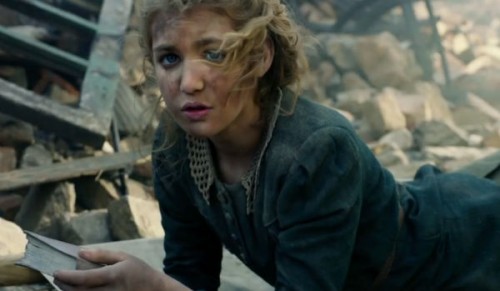
Rudy also commits rebellious acts. On the one hand, as the book notes, he is “not the junior misogynistic type of boy at all,” something that has for too long been a norm of boyhood. On the other, his hero is the African American Olympic runner Jesse Owens—the man who refused to shake Hitler’s hand, though this direct political detail in the book is unfortunately not included in the film. The movie, does, however insist that racism is learned, and that Rudy has not learned it, as when his father tells him exasperatedly, “You can’t go around painting yourself black” when he does so in order to feel like Jessie Owens as he runs a race.
Similarly, though Death narrates the book, many of the characters refuse to give in to the death and destruction around them. Instead, they turn the toughest of times into opportunities for empathy and kindness—or, figuratively, to take the graveness out of death. Indeed, two of the book’s at the center of the narrative are very grave indeed, one being The Grave Digger’s Handbook and the other Hitler’s Mein Kampf. With one, Liesel learns to read; with the other, she learns to write. Thus books infused with death are used to give life to Liesel’s story and, more broadly, books, literacy and storytelling offer vital opportunities for transgression in an age of book burning.
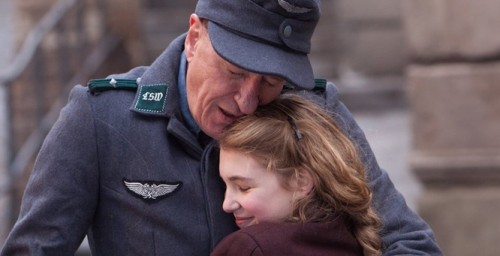
That Liesel’s story is made possible by Max painstakingly painting the pages of Mein Kampf white, so as to create a “blank” journal in which Liesel can write is also key. Firstly, it visually negates Hitler’s heinous manifesto of hate, erasing his words with thick paint. Secondly, as the paint is white, it nods to the white Aryan supremacy promoted by Hitler and others in a way that suggests whiteness need not be the privileged, oppressive category it has been for so long. It can be, as indicated by Rudy—the white boy who paints himself black—covered over to tell a different story. Thirdly, the fact that Liesel uses the now-blank pages to write The Book Thief over the hidden words of Hitler suggests not that we “whitewash” history, but that we use what is at our disposal to make this often all-too-ugly world more bearable.
Reviews of the film thus far have been very mixed, with the most common criticism being that it’s too slow and long. For contemporary audiences, this critique has some merit. However, the critique could just as well be directed at audiences, and the film industry at large, for its penchant towards action-packed, special-effects focused, razzle-dazzle types of films. Not everything need be in 3D or filled with explosions to be entertaining. I fear for the slow death of classic films that unfold via complex characters, quiet moments and the multifaceted feelings they bring forth in the viewer. On this count, The Book Thief gives me hope.
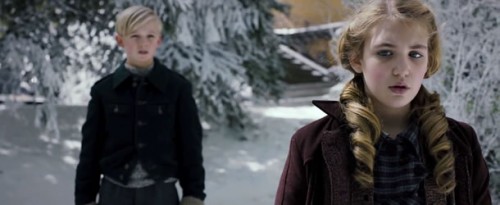
Directed by Brian Percival (who directed several episodes of the similarly classy Downton Abbey), the film holds a special appeal for book lovers, centering as it does on the power of a good book and how literacy changes lives and words shape our existence.
It also gives me hope that perhaps we are undergoing what Melissa Silverstein of Women and Hollywood calls “A Female Revolution at the Box Office.” Says Silverstein,
It is so rare to see a full-on, beautiful shot of a young woman to open a film. And from that first moment, this young woman just commands the screen and leads this film in every way.
Though Silverstein is referring to Jennifer Lawrence as Katniss in The Hunger Games: Catching Fire, the same can be said of Nélisse: She is the heart of the film, bringing the character of Liesel to life in a haunting and mesmerizing way.
If you can steal two hours and five minutes from holiday shopping and parties to see this film, I urge you to do so. Though different from Catching Fire, its talented lead actress and its emotional message might very well burn their way into your heart.
On of my favourite movies and books- so beautiful.